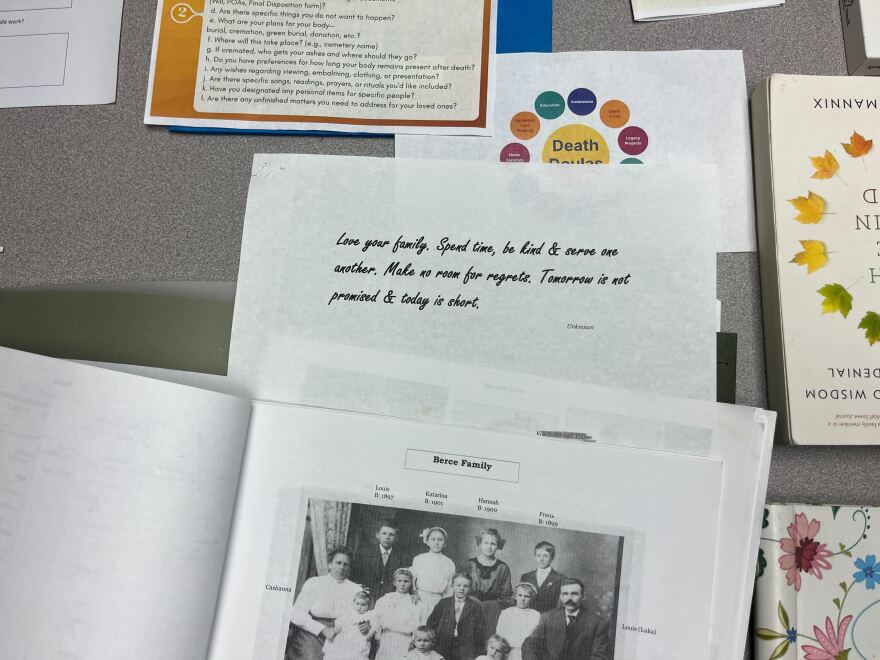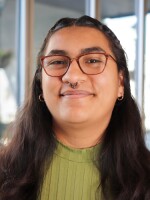Natalie Krawczyk describes herself as an optimistic person, someone who looks for the best in everyone and everything. She loves spending time with her kids and grandkids. Some of her favorite moments are the breakfasts she shares with her 23-year-old-grandaughter, who lives in the apartment above hers in Milwaukee’s Bay View neighborhood.
Krawczyk says, as a woman who likes to be prepared, she's also thought often about death, and how her family will remember her.
“I’ve been incredibly healthy all my life, and about two years ago I ended up in the hospital for nine days and what happened is, they all got scared to death because they’ve never seen their mom sick," says Krawczyk. "It prompted me to say 'Hey, I may have been healthy all my life but wait a minute. We need to start thinking about the fact that I may not be here for the next 20 years.'”
Beginning to plan the end
After she recovered, Krawczyk began looking for resources to prepare for the end of her life, whenever that comes. She found a web post on local end-of-life doulas and Death Cafes. Those are gatherings of people who want to talk about grief, death and dying in a supportive space.
The post led her to having her first conversation with Milwaukee Death Doula Martha Badger.
“I thought, I don’t know anything about this. And she (Martha) was kind enough to explain it to me, in depth," says Krawczyk. "I was just enthralled with the fact that you could actually talk about these things in a format where everyone was comfortable with it.”
Death Doulas, also known as End-of-Life doulas, help people and their families prepare for death — through events like the Death Cafes, advanced care planning and grief support. Death Doula Martha Badger says the goal is to make the transition in life as manageable as possible for everyone.

“There’s so much we can think about and prepare for, for death, that we don’t want to talk about or prepare for," says Badger. "Generally, asa society we have death phobia, people avoid talking about death, and then when the person dies, you’re supposed to know exactly what to do while you’re grieving. It’s just not fair.”
What can we do?
Badger says it’s possible to prepare by reading, getting documents in order, and talking to loved ones about what you want out of life and how you want to be remembered.
Death doulas are becoming more common across the nation. Badger and her partner Gil-Marie Janssen go by the name, the “Greater Milwaukee Death Doulas.” They are just two end-of-life doulas in the Milwaukee-area.
Badger and Janssen were trained in the practice by several organizations: The Dying Year, Conscious Dying Institute and Village Deathcare. The two volunteer their services through the Death Cafes, organizing home funerals, vigils and other offerings. Badger also has been a registered nurse for over 30 years and Janssen regularly volunteers at hospice centers.
One of their approaches as death doulas is to help people with what are called “legacy projects.” These are personal projects that serve to keep a person’s memories, attributes and values preserved for future generations.
Krawczyk actually began her legacy project over 30 years ago, after her husband died. That’s when she started writing a journal.

It was after going to the death cafes that she began investing more into getting her affairs in order and thinking about what she wanted to leave behind for her children and future generations.
She wanted her legacy to be more than just the highlights of her life. In addition to continuing her journal, Krawczyk created her own record of her family and ancestors for her children. She also started writing a book.

“When my granddaughter was a baby and I was holding her, she was patting my face and she said, ‘Grandma, way back when you’re face was smooth...’ and so my book is called, Way Back When My Face Was Smooth," says Krawczyk. "I'm writing stories now of some of the things that I did as a child with my brother and when we would play in the woods and the forest and so it’s just another aspect of things I can leave.”
Death Doula Gil-Marie Janssen says part of the death doula approach is to normalize and destigmatize death as a necessary step in life. She says when you reframe how you think about life, and slow down to take in your surroundings, that can put you in the mindset of accepting death as the final stage.
“I think about death every day, not in a macabre or morose way, but just in a this is a part of life," explains Janssen. "The mindfulness of slowing down and looking up at the clouds, what do they look like today? Or noticing that flower that was bright and bursting with color yesterday but today is starting to fade, and all the symbolism we see in nature and just like being present in the moment. And I think that helps.”
When a life starts, there is the option to have guidance from a birth doula. Now, people can receive the same support when approaching the end of a life.






